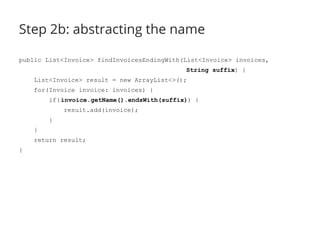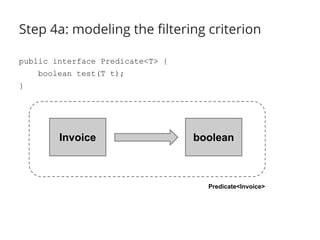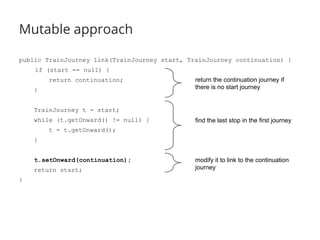Ad
Pragmatic Functional Refactoring with Java 8
- 1. Pragmatic Functional Refactoring with Java 8 Raoul-Gabriel Urma (@raoulUK) Richard Warburton (@RichardWarburto)
- 4. First-class Functions Currying Immutability Optional Data Types Conclusions
- 5. Step 1: filtering invoices from Oracle public List<Invoice> findInvoicesFromOracle(List<Invoice> invoices) { List<Invoice> result = new ArrayList<>(); for(Invoice invoice: invoices) { if( invoice.getCustomer() == Customer.ORACLE) { result.add(invoice); } } return result; }
- 6. Step 2a: abstracting the customer public List<Invoice> findInvoicesFromCustomer(List<Invoice> invoices, Customer customer) { List<Invoice> result = new ArrayList<>(); for(Invoice invoice: invoices) { if( invoice.getCustomer() == customer) { result.add(invoice); } } return result; }
- 7. Step 2b: abstracting the name public List<Invoice> findInvoicesEndingWith(List<Invoice> invoices, String suffix) { List<Invoice> result = new ArrayList<>(); for(Invoice invoice: invoices) { if( invoice.getName().endsWith(suffix)) { result.add(invoice); } } return result; }
- 8. Step 3: messy code-reuse! private List<Invoice> findInvoices(List<Invoice> invoices, Customer customer, String suffix, boolean flag) { List<Invoice> result = new ArrayList<>(); for(Invoice invoice: invoices) { if(( flag && invoice.getCustomer() == customer) || (!flag && invoice.getName().endsWith(suffix))) { result.add(invoice); } } return result; }
- 9. Step 4a: modeling the filtering criterion public interface Predicate<T> { boolean test(T t); } Invoice boolean Predicate<Invoice>
- 10. Step 4b: using different criterion with objects private List<Invoice> findInvoices(List<Invoice> invoices, Predicate<Invoice> p) { List<Invoice> result = new ArrayList<>(); for(Invoice invoice: invoices) { if( p.test(invoice)) { result.add(invoice); } } return result; }
- 11. Step 4b: using different criterion with objects List<Invoice> specificInvoices = findInvoices(invoices, new FacebookTraining()); class FacebookTraining implements Predicate<Invoice> { @Override public boolean test(Invoice invoice) { return invoice.getCustomer() == Customer.FACEBOOK && invoice.getName().endsWith("Training"); } }
- 12. Step 5: method references public boolean isOracleInvoice(Invoice invoice) { return invoice.getCustomer() == Customer.ORACLE; } public boolean isTrainingInvoice(Invoice invoice) { return invoice.getName().endsWith("Training"); } List<Invoice> oracleInvoices = findInvoices(invoices, this::isOracleInvoice); List<Invoice> trainingInvoices = findInvoices(invoices, this::isTrainingInvoice); method references
- 13. Step 6: lambdas List<Invoice> oracleInvoices = findInvoices(invoices, invoice -> invoice.getCustomer() == Customer.ORACLE); List<Invoice> trainingInvoices = findInvoices(invoices, invoice -> invoice.getName().endsWith("Training"));
- 14. First-class functions ● Common Object Oriented concept: Function Object ● All it means is the ability to use a function just like a regular value ○ Pass it as argument to a method ○ Store it in a variable ● Helps cope with requirement changes
- 15. Composing functions Functions Composing functions
- 16. Composing functions: example import java.util.function.Predicate; Predicate<Invoice> isFacebookInvoice = this::isFacebookInvoice; List<Invoice> facebookAndTraining = invoices.stream() .filter( isFacebookInvoice.and(this::isTrainingInvoice)) .collect(toList()); List<Invoice> facebookOrGoogle = invoices.stream() creating more complex functions from building blocks .filter( isFacebookInvoice.or(this::isGoogleInvoice)) .collect(toList());
- 17. Composing functions: why does it work? public interface Predicate<T> { boolean test(T t); default Predicate<T> and(Predicate<? super T> other) { Objects.requireNonNull(other); return (t) -> test(t) && other.test(t); } default Predicate<T> or(Predicate<? super T> other) { Objects.requireNonNull(other); return (t) -> test(t) || other.test(t); } } returns a new function that is the result of composing two functions
- 18. Creating function pipelines (1) public class Email { private final String message; public Email(String message) { this.message = message; } public Email addHeader() { return new Email("Dear Sir/Madam:n" + message); } public Email checkSpelling() { return new Email(message.replaceAll("FTW", "for the win")); } public Email addSignature() { return new Email(message + "nKind regards"); } }
- 19. Creating function pipelines (2) import java.util.function.Function; Function<Email, Email> addHeader = Email::addHeader; Function<Email, Email> processingPipeline = addHeader.andThen(Email::checkSpelling) .andThen(Email::addSignature); andThen andThen composing functions addHeader checkSpelling addSignature Email {message="Java 8 FTW!"} Email{message='Dear Sir/Madam: Java 8 for the win! Kind regards'}
- 20. Creating function pipelines (3) import java.util.function.Function; Function<Email, Email> addHeader = Email::addHeader; Function<Email, Email> processingPipeline = addHeader.andThen(Email::addSignature); andThen composing functions addHeader addSignature Email {message="Java 8 FTW!"} Email{message='Dear Sir/Madam: Java 8 FTW! Kind regards'}
- 21. First-class Functions Currying Immutability Optional Data Types Conclusions
- 22. Example: A Conversion Function double convert(double amount, double factor, double base) { return amount * factor + base; } // Usage double result = convert(10, 1.8, 32); assertEquals(result, 50, 0.0);
- 23. Using the conversion function // Temperatures double cInF = convert(10, 1.8, 32); double higherTemp = convert(30, 1.8, 32); // Currencies double dollarsInPounds = convert(10, 0.6, 0); // Distance double kilometresInMiles = convert(27, 0.62137, 0);
- 24. So what’s the problem? ● Abstraction ○ How do you write something that operates on different conversion functions? ● Reuse ○ How do you use the conversion function in different places?
- 26. Currying the conversion function DoubleUnaryOperator convert(double factor, double base) { return amount -> amount * factor + base; } DoubleUnaryOperator convertCtoF = convert(1.8, 32); double result = convertCtoF.applyAsDouble(10); assertEquals(result, 50, 0.0);
- 28. Partial Application Examples // Temperatures DoubleUnaryOperator convertCtoF = convert(1.8, 32); // Currencies DoubleUnaryOperator convert$to£ = convert(0.6, 0); // Distance DoubleUnaryOperator convertKmToMi = convert(0.62137, 0);
- 29. Summary ● Currying is about splitting up the arguments of a function. ● Partial Application is a function “eating” some of its arguments and returning a new function
- 30. First-class Functions Currying Immutability Optional Data Types Conclusions
- 31. Mutable objects public class TrainJourney { private int price; private TrainJourney onward; public TrainJourney(int price, TrainJourney onward) { this.price = price; this.onward = onward; } public int getPrice() { return price; } public TrainJourney getOnward() { return onward; } public void setPrice(int price) { this.price = price; } public void setOnward(TrainJourney onward) { this.onward = onward; } }
- 32. Immutable objects public class TrainJourneyImmutable { private final int price; private final TrainJourneyImmutable onward; public TrainJourneyImmutable(int price, TrainJourney onward) { this.price = price; this.onward = onward; } public int getPrice() { return price; } public TrainJourneyImmutable getOnward() { return onward; } public TrainJourneyImmutable withPrice(int price) { return new TrainJourneyImmutable(price, getOnward()); } public TrainJourneyImmutable withOnward(TrainJourneyImmutable onward) { return new TrainJourneyImmutable(getPrice(), onward); } }
- 33. Scenario: be able to link together train journeys to form longer journeys.
- 35. Mutable approach public TrainJourney link(TrainJourney start, TrainJourney continuation) { if (start == null) { return continuation; } TrainJourney t = start; while (t.getOnward() != null) { t = t.getOnward(); } t.setOnward(continuation); return start; } return the continuation journey if there is no start journey find the last stop in the first journey modify it to link to the continuation journey
- 36. Mutable approach: problem TrainJourney firstJourney = link(start, continuation); TrainJourney secondJourney = link(start, continuation); visit(secondJourney, tj -> { System.out.print(tj.price + " - "); }); static void visit(TrainJourney journey, Consumer<TrainJourney> c) { if (journey != null) { c.accept(journey); visit(journey.onward, c); } }
- 39. Immutable approach public TrainJourneyImmutable link(TrainJourneyImmutable start, TrainJourneyImmutable continuation) { return start == null ? continuation : new TrainJourneyImmutable(start.getPrice(), link(start.getOnward(), continuation)); }
- 40. Related topics ● Domain Driven Design ○ Value Classes are Immutable ● Core Java Improvements ○ New date & time library in Java 8 has many Immutable Objects ○ Current Value Types proposal is immutable ● Tooling ○ final keyword only bans reassignment ○ JSR 308 - improved annotation opportunities ○ Mutability Detector ○ Findbugs
- 41. Immutable objects reduce the scope for bugs.
- 42. First-class Functions Currying Immutability Optional Data Types Conclusions
- 43. Don’t we all love it? Exception in thread "main" java.lang.NullPointerException
- 44. public String getCarInsuranceName(Person person) { return person.getCar().getInsurance().getName(); } Where’s the NPE?
- 45. Defensive checking public String getCarInsuranceName(Person person) { if (person != null) { Car car = person.getCar(); if (car != null) { Insurance insurance = car.getInsurance(); if (insurance != null) { return insurance.getName(); } } } return "No Insurance"; }
- 46. Optional ● Java 8 introduces a new class java.util.Optional<T> ○ a single-value container ● Explicit modelling ○ Immediately clear that its an optional value ○ better maintainability ● You need to actively unwrap an Optional ○ force users to think about the absence case ○ fewer errors
- 47. Updating model public class Person { private Optional<Car> car; public Optional<Car> getCar() { return car; } } public class Car { private Optional<Insurance> insurance; public Optional<Insurance> getInsurance() { return insurance; } } public class Insurance { private String name; public String getName() { return name; } }
- 48. Optional.map
- 49. Why it doesn’t work? Optional<People> optPerson = Optional.ofNullable(person); Optional<String> name = optPeople.map(Person::getCar) .map(Car::getInsurance) .map(Insurance::getName); returns Optional<Optional<Car>> Invalid, the inner Optional object doesn’t support the method getInsurance! public class Person { private Optional<Car> car; public Optional<Car> getCar() { return car; } }
- 51. Optional.flatMap
- 52. Chaining methods with flatMap public String getCarInsuranceName(Person person) { return Optional.ofNullable(person) .flatMap(Person::getCar) .flatMap(Car::getInsurance) .map(Insurance::getName) .orElse("Unknown"); } default value if the resulting Optional is empty
- 53. Consistent use of Optional replaces the use of null
- 54. First-class Functions Currying Immutability Optional Data Types Conclusions
- 55. Summary of benefits ● First-class functions let you cope for requirement changes ● Currying lets you split the parameters of a function to re-use code logic ● Immutability reduces the scope for bugs ● Optional data types lets you reduce null checking boilerplate and prevent bugs
- 57. Training Website: http://java8training.com http://manning.com/urma http://tinyurl.com/java8lambdas
- 58. Any Questions? Richard Warburton @richardwarburto Raoul-Gabriel Urma @raoulUK
- 59. Example currying use cases ● Large factory methods ○ Partially apply some of the arguments and then pass this factory object around. ● Parser Combinators ○ many(‘a’) - function which parses a, aa, aaa, etc.
- 60. A curry function // int -> (int -> int) IntFunction<IntUnaryOperator> curry(IntBinaryOperator biFunction) { return f -> s -> biFunction.applyAsInt(f, s); } // Usage: IntFunction<IntUnaryOperator> add = curry((f, s) -> f + s); int result = add.apply(1) .applyAsInt(2); assertEquals(3, result);
- 61. Generalised curry function // F -> (S -> R) <F, S, R> Function<F, Function<S, R>> curry(BiFunction<F, S, R> biFunction) { return f -> s -> biFunction.apply(f, s); }











































































































































